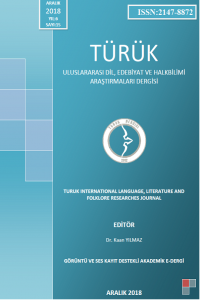TATAR DİLİ ŞİVELERİNDEKİ BİLEŞİK GEÇMİŞ ZAMAN BİÇİMLERİ
Tatar edebi ve şive dilinde birçok bileşik geçmiş zaman biçimlerine rastlanır. Onlar konuşma anına kadar yapılmış olan eylemin gerçekleşme özelliklerini belirtmek için kullanılırlar. Yazar, makalede Türkoloji ilminde ilk olarak Tatar ağızları malzemeleri temelinde bileşik biçimleri ayırma ölçütlerini belirlemeye ve onları her bakımdan sistemli şekilde incelemeye çalışmıştır. Yazıda bütün ağızlarda da rastlanan çekirdek ve onların sadece bazılarında kullanılmakta olan kenar birimler ayrılmıştır. Dil birimleri sistemli-senkron, lengüistik coğrafya ve areal (bölgesel) bakımlardan incelendi.
A ANALYTICAL VERB FORMS OF PAST TENSE IN DIALECTS OF TATAR LANGUAGE
Tatar standard and dialect languages are defined by abundance of various analytical forms of Past Tense for expressing different shades of activity in the past that happened before the moment of speech. For the first time in Turkic science in Russia the author strives to define criteria of analytical forms of Past Tense of Indicative Mood based on Tatar subdialects matter. And also he aspires to give all-round, deep and system-oriented analysis of those verbs in Tatar dialect language. General and core elements that are typical for all subdialects and also peripheral ones, used in some of them, are highlighted in the article. Systematic synchronized description of language phenomenon is accompanied by areal and linguistic geographical interpretation. The author in the study of grammatical meanings of analytical forms pays great attention to the role of the auxiliary verb är (ide) in the formation of grammatical semantics of the past tense. This verb in conjunction with the main verb takes referred action to the past tense with different shades of its completeness and perfection. Analytical forms of the past tense in the subdialects of the Tatar language can be based on the verbs of all three tenses, which due to the main verb forms express the meaning of the past tense with different shades of all three tenses. The forms that derived from basic verbs with -a (-a ide), - adyr (-adyr ide), -a torgan (-a torgan ide), -uchan (-uchan ide), -uchy (-uchy ide) express past actions related to the present time; -yr ide, -asy ide, -achak ide - past actions related to the future time; -gan ide, -dy ide,-uly ide, -ganda ide - indicates the action in the indefinite past, which does not have close relation with the moment of speech. This article describes all the phonetic and morphological variants found in subdialects of the Tatar language as well as allocates the isoglosses of their distribution in the Tatar dialect system and beyond.
